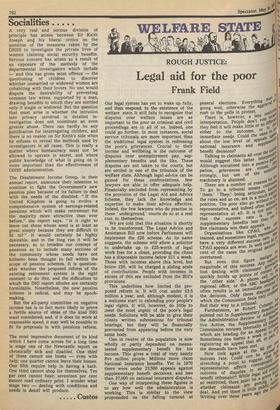Socialities A very real and serious division of principle has
arisen between Sir Keith Joseph and his liberal critics on the question of the measures taken by the DHSS to investigate the private lives of women claiming social security benefits. Serious concern has arisen as a result of an exposure of the methods of the departmental investigators which include — and this has given most offence — the questioning of children to discover whether unmarried or widowed women are cohabiting with their lovers. No one would dispute the desirability of preventing common law wives, supported by a man, drawing benefits to which they are entitled only if single or widowed. But the question that must arise is whether the intrusion into privacy involved in detailed investigation does not constitute an even greater abuse. There can hardly be any justification for interrogating children, and there is no reason on Sir Keith's side when he refuses to reveal the methods used by investigators in all cases. This is really a matter where bureaucracy must not be allowed to operate in secret, and where public knowledge of what is going on is more important than the effectiveness of DHSS administration.
The Disablement Income Group, in their annual report, announce their intention to continue to fight the Government's new pension plan because of its failure to deal with the needs of the disabled. "If the United Kingdom is going to evolve a comprehensive system of earnings-related, pensions which will make retirement for the majority more attractive than ever before," the report says, " is it right to leave out those whose need is at least as great simply because they are difficult to fit in?" It would certainly be highly desirable, and in the long run it will be necessary, so to broaden our concept of pensions as to include many sections of the community whose needs have not hitherto been thought to fall within the scope of pension schemes. It is questionable whether the proposed reform of the existing retirement system is the right moment to do this, and the difficulties to which the DIG report alludes are certainly formidable. Nonetheless, the new pension scheme is radical, and may be epochmaking.
But the all-party committee on negative income tax is in fact more likely to prove a fertile source of ideas of the kind DIG want considered; and, if it does its work at reasonable speed, it may well be possible to fit its proposals in with pensions reform.
The most impressive document of its kind which I have come across for a long time is stage one of the Newcastle report on chronically sick and disabled, One third of these cannot use buses — even with help; one quarter cannot leave their homes. One fifth require help in having a bath. One third cannot shop for themselves. Ten per cent cannot hear, seventeen per cent Cannot read ordinary print. I wonder what stage two — dealing with conditions and needs in detail will produce.
CUStOS










































 Previous page
Previous page